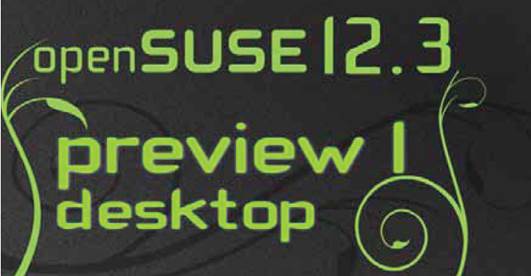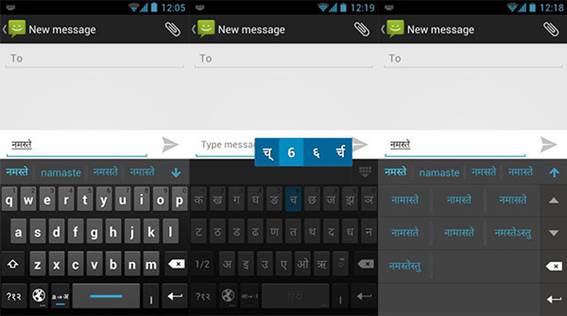The openSUSE project, the worldwide
community that promotes Linux and creates Linux distributions, has released
openSUSE 12.3. The latest version of openSUSE offers the integration of systems
and delivers better system log experience with journals.
OpenSUSE 12.3 has been loaded with
graphical package management tools and a new theme that brings consistent
performance right from the boot to the desktop. The 1 GB live images have now
been optimized for USB sticks, and the ARM team has readied stable OpenSUSE
12.3 ARM v7 and experimental ARM 64-bit images for this architecture. According
to a post on the OpenSUSE website, the latest desktop delivers faster metadata
handling, a new print manager, provides improved Bluetooth integration in KDE’s
Plasma Desktop, improved notifications, better file management and account
integration for Exchange and Windows Live in GNOME Shell.

OpenSUSE
12.3 released
Apart from the experiential features, the
12.3 comes with a host of new technologies like PostgreSQL 9.2 that has native
JSON support (NoSQL style).
Now type in Hindi on your Android device
Now go desi while texting on your Android
phone. Android has apparently released its Hindi keyboard app, Google
Hindi Input, which is available at Google
Play.
The app is said to be compatible with any
Android smartphone or tablet that runs Android 2.2 aka FroYo or later, which
basically includes any phone or tablet that entered in the market in the last
couple of years.

Now
type in Hindi on your Android device
Other than a Hindi keyboard, the Google
Hindi Input also adds English-to-Hindi transliteration mode, which means you
can type in Hindi the same way as it is done in English. Transliteration mode
basically converts the Hindi words written in English (Roman/Latin) script to
actual words in the Devnagari script.
Here are the steps to follow for Hindi
texting:
- Toggle the button ‘a->?’ on the English keyboard to turn
on/off transliteration mode.
- In the transliteration mode, you can type a Hindi word using
English letters of the alphabet and the app will convert them to Hindi.
- By turning off the transliteration mode on the English
keyboard, you can type in English.
- Toggle the globe button to switch between the English and Hindi
keyboard.
- Consonants are alphabetically ordered into two pages.
- Press the paging button “1/2” “2/2” to
navigate between pages. Long-press the character key to select various
forms in the pop-up.
Evernote hacked; resets passwords of
users
Evernote, the Web-based note sharing
service, fell prey to the dark forces of the cyber world. Evernote has said
that it has reset the passwords of its 50 million users because it was hacked.
The hackers have breached Evernote's computer network and have managed to
access details of the users including their user names, email addresses and
encrypted passwords.
According to a Reuters report, Ronda Scott,
spokeswoman for Evernote, sent out an email saying, “The attack follows a
similar pattern to other cyber-attacks on Internet-based companies in recent
weeks”.

Evernote
hacked; resets passwords of users
The company informed its users about the
attack on its website stating, “In our security investigation, we have found no
evidence that any of the content you store in Evernote was accessed, changed or
lost. We also have no evidence that any payment information for Evernote
Premium or Evernote Business customers was accessed”.
However, no information on how many
accounts have been compromised could be gathered. The spokeswoman also was
tight-lipped on whether the hackers have unscrambled encrypted passwords.
GNOME and Kylin are now official Ubuntu
flavors
Here is some good news for Ubuntu
enthusiasts. Ubuntu GNOME and UbuntuKylin have finally been officially
designated as Ubuntu flavors by the Ubuntu Technical board. For the
uninitiated, Ubuntu GNOME 3 delivers GNOME 3 experience on Ubuntu and UbuntuKylin
offers a fully customized Chinese user experience on Ubuntu 13.04.

GNOME
and Kylin are now official Ubuntu flavors
The official designation means that now
developers of the two flavors will get access to Ubuntu's build infrastructure.
The flavors can now be managed as part of the Ubuntu project instead of an
unsupported fork.
In October 2012, Ubuntu GNOME was first
unveiled along with Ubuntu 12.10. Moreover, it is the only formal release of
the Ubuntu GNOME distro besides the 12.10.1 update. Now the next development
release can be expected along with the 13.04 final betas.
Besides its Chinese language support,
UbuntuKylin will also extend China centric changes to the Unity environment.
The changes will include “…making the online music search access music websites
in China, adding Chinese calendar support alongside lunar and Gregorian
calendars, and making the weather forecast pull its information from the China
Meteorological Administration”.
Intel releases Android 4.2 with
dual-mode Windows 8 option
Intel has been quite late in catching up
with the Android iteration. It is only recently that the hardware company
decided to introduce the Lexington chipset, which can be used on entry-level
phones made by Xolo, Asus and Safaricom.
Apparently, Intel has upped the ante and
the latest move by the chip-maker has been to release Android 4.2 (Jelly Bean)
developer code that can be used on Intel-based hardware, most notably Windows 8
running systems.

Intel
releases Android 4.2 with dual-mode Windows 8 option
Intel developers at its Open Source
Technology Center have been working on the Intel-optimized Android 4.2.2 alpha
dev code, which can be used on Windows 8 with the dual-mode option.
The post states that the developer code
offers UEFI boot support, as well as support for dual-booting with Microsoft’s
Windows 8. The dev code is said to be powered by the Linux 3.8 kernel and comes
bundled with an interactive installer which will make working easier.
Now plug your Android to boot Linux on a
PC
The benefits of Android are growing by
leaps and bounds. Those who have used Linux operating systems know that you
boot Fedora, Ubuntu or many other distros from a CD, DVD, or flash drive. Now
you can add another option to the list, your Android phone.
Using DriveDroid, which is a free app, you
can store a Linux ISO on your phone and directly boot that disk image by
plugging it to a PC.
With this, you will not have to overwrite
Windows or any other OS running on your PC’s hard drive and can easily boot
into an operating system such as Ubuntu or Chromium OS.
This also gives you the freedom to test the
OS before finally installing it and allows you to boot a Linux OS on a PC as a
sort of repair utility, wherein you can reformat the hard drive, recover files,
or perform other operations if there’s something wrong with your primary
operating system, the report further stated.
Using DriveDroid, you can also download
Linux-based operating systems. The list includes Ubuntu, Fedora, Arch, CrunchBang,
Debian and OpenSUSE.
DriveDroid requires a rooted phone or
tablet and a USB cable to work properly. Some operating systems and some
Android devices may not work as well as others.